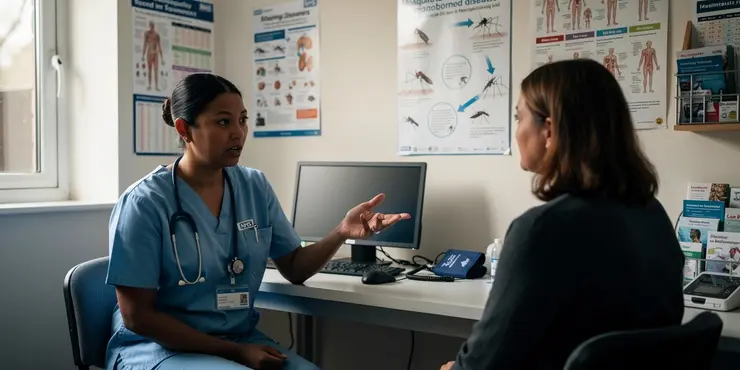
Find Help
More Items From Ergsy search
-

What are the symptoms of West Nile Virus?
Relevance: 100%
-

What is West Nile Virus?
Relevance: 94%
-

What is West Nile Virus?
Relevance: 93%
-

Are there treatments for West Nile Virus?
Relevance: 92%
-

Is there a vaccine for West Nile Virus?
Relevance: 92%
-

Is there a test for West Nile Virus?
Relevance: 92%
-

How prevalent is West Nile virus in the UK?
Relevance: 88%
-

Can pets get West Nile Virus?
Relevance: 87%
-

How is West Nile Virus transmitted?
Relevance: 86%
-

Which countries are affected by West Nile Virus?
Relevance: 86%
-

What should I do if I think I have West Nile Virus?
Relevance: 84%
-

Who is at risk for severe illness from West Nile Virus?
Relevance: 82%
-

How do health officials monitor West Nile Virus?
Relevance: 80%
-

How can West Nile Virus be prevented?
Relevance: 57%
-

Can mosquitoes carrying West Nile Virus be controlled?
Relevance: 55%
-

Can you get West Nile Virus more than once?
Relevance: 54%
-

What other viruses are tested for in blood donations?
Relevance: 44%
-

Are UK mosquitoes capable of transmitting Zika virus?
Relevance: 41%
-

What diseases are spread by mosquitos in the UK in 2025?
Relevance: 39%
-

What are the symptoms of Zika virus?
Relevance: 36%
-

When is West Nile Virus most active?
Relevance: 36%
-

What are the symptoms of Nipah Virus infection?
Relevance: 35%
-

What symptoms should I watch for if I suspect a mosquito-borne disease?
Relevance: 34%
-

What are the symptoms of Marburg virus disease?
Relevance: 34%
-

Is the Marburg virus related to the Ebola virus?
Relevance: 34%
-

What is the Ebola virus?
Relevance: 32%
-

Can West Nile Virus be transmitted from person to person?
Relevance: 31%
-

Can West Nile Virus spread through blood transfusions or organ transplants?
Relevance: 28%
-
Do all mosquitoes in the UK carry diseases?
Relevance: 27%
-

What is the Marburg Virus?
Relevance: 26%
-

Is there a cure for Nipah Virus?
Relevance: 26%
-

What is Nipah Virus?
Relevance: 26%
-

What regions of the UK are most affected by mosquito-borne diseases?
Relevance: 25%
-

Is Zika virus present in the UK?
Relevance: 25%
-

What are the symptoms of Chikungunya virus infection?
Relevance: 25%
-

What is Chikungunya virus infection?
Relevance: 25%
-

How is Nipah Virus diagnosed?
Relevance: 24%
-

Does the UK have Zika virus?
Relevance: 24%
-

Can Nipah Virus cause outbreaks?
Relevance: 24%
-

What is the typical progression of Marburg virus disease?
Relevance: 24%
What is West Nile Virus?
West Nile Virus (WNV) is a viral infection primarily transmitted to humans through the bite of an infected mosquito. While most commonly spread by Culex species mosquitoes, other mosquitoes have also been known to transmit the virus. It is important to understand the symptoms associated with West Nile Virus to recognize and manage its impact effectively.
Common Symptoms of West Nile Virus
Most people infected with the West Nile Virus, approximately 80%, do not exhibit any symptoms. For those who develop symptoms, the illness is generally mild and flu-like. The common symptoms that may appear 2 to 14 days after exposure include:
- Fever: Many individuals experience a sudden onset of fever, which can be persistent and vary in intensity.
- Headache: A prominent, often severe headache is a typical symptom accompanying the fever.
- Fatigue and Body Aches: General malaise, tiredness, and muscle aches are common, causing discomfort and reduced activity levels.
- Nausea and Vomiting: Some individuals may experience gastrointestinal symptoms, including nausea, vomiting, and a loss of appetite.
- Rash: A rash may appear, usually on the trunk of the body, presenting as skin redness or patches. This symptom is less common but can occur in some cases.
Severe Symptoms of West Nile Virus
In a small percentage of individuals, approximately 1 in 150 infected people, the virus leads to severe neurologic illness, which can be life-threatening. The severe manifestations of West Nile Virus can include:
- High Fever: A much higher fever compared to mild cases, often indicating a more serious infection.
- Severe Headache: Persistent and intense headaches, often accompanied by neck stiffness.
- Disorientation and Confusion: The virus can cause significant changes in mental status, leading to confusion, disorientation, or even coma.
- Muscle Weakness: Severe muscle weakness or paralysis may occur, impacting mobility and coordination.
- Seizures: Some affected individuals may experience seizures as a result of the infection.
- Vision Loss: In rare instances, the virus can cause visual disturbances or partial loss of vision.
Who is at Risk?
While anyone can be infected with the West Nile Virus, certain populations are at higher risk of developing severe symptoms. Older adults, particularly those over the age of 60, and people with weakened immune systems or pre-existing health conditions are more susceptible to severe complications.
Conclusion
Awareness of the symptoms associated with West Nile Virus is crucial for early detection and management. If you or someone you know experiences symptoms, especially severe symptoms, after mosquito exposure, it is advisable to seek medical attention promptly. Using preventive measures such as mosquito repellent and wearing protective clothing can help reduce the risk of infection.
What is West Nile Virus?
West Nile Virus (WNV) is a sickness you can get from a mosquito bite. Mosquitoes get the virus and then pass it to people when they bite them. It is important to know what signs to look for so that you can deal with the virus early.
Common Symptoms of West Nile Virus
Most people who get West Nile Virus, about 80 out of 100, do not feel sick at all. If someone does get sick, it usually feels like a mild flu. These symptoms can show up 2 to 14 days after a mosquito bite:
- Fever: A high temperature that starts quickly.
- Headache: A strong headache that comes with the fever.
- Tiredness and Body Aches: Feeling very tired and having sore muscles.
- Nausea and Vomiting: Feeling sick to the stomach or throwing up, and not wanting to eat.
- Rash: You might get red spots or patches on your skin. This does not happen to everyone.
Severe Symptoms of West Nile Virus
Just a few people, about 1 in 150, can get very sick from West Nile Virus. In these cases, the sickness can be very dangerous. Severe symptoms include:
- High Fever: A very high temperature that is worse than in mild cases.
- Severe Headache: A really bad headache that might make your neck stiff.
- Disorientation and Confusion: Feeling very confused or having trouble thinking clearly.
- Muscle Weakness: Weak muscles or trouble moving.
- Seizures: Some people might have seizures, which are sudden, uncontrolled body movements.
- Vision Loss: Trouble seeing or partial loss of sight, but this is rare.
Who is at Risk?
Anyone can get West Nile Virus, but some people are at higher risk. Older people, especially those over 60, and people with weak immune systems or other health problems can get sicker from the virus.
Conclusion
Knowing the signs of West Nile Virus is very important. If you or someone you know feels sick after a mosquito bite, see a doctor quickly, especially if the symptoms are severe. Protect yourself by using bug spray and wearing clothes that cover your skin to keep mosquitoes away.
Frequently Asked Questions
What are common symptoms of West Nile Virus?
Most people infected with West Nile Virus do not develop symptoms. About 1 in 5 people who are infected will develop a fever with other symptoms such as headache, body aches, joint pains, vomiting, diarrhea, or rash.
Can West Nile Virus cause severe symptoms?
Yes, about 1 in 150 people infected with West Nile Virus develop a severe illness affecting the central nervous system, such as encephalitis or meningitis.
What are severe symptoms of West Nile Virus?
Severe symptoms can include high fever, headache, neck stiffness, stupor, disorientation, coma, tremors, seizures, or muscle weakness.
How long do symptoms of West Nile Virus typically last?
Mild symptoms usually last a few days, though some people experience fatigue and weakness that can last for weeks or months.
Is there a rash associated with West Nile Virus?
Yes, some individuals with West Nile Virus may develop a rash.
What should I do if I experience symptoms of West Nile Virus?
If you experience severe symptoms such as a high fever, headache, neck stiffness, or confusion, seek medical attention immediately. For mild symptoms, rest, fluids, and over-the-counter pain relievers may help.
Are gastrointestinal symptoms common with West Nile Virus?
Yes, gastrointestinal symptoms such as nausea, vomiting, or diarrhea can occur with West Nile Virus.
Can West Nile Virus cause neurological symptoms?
Yes, in severe cases, the virus can cause neurological symptoms such as encephalitis or meningitis, leading to confusion, seizures, and muscle weakness.
Is fever a symptom of West Nile Virus?
Yes, fever is a common symptom among those who develop symptoms of West Nile Virus.
Can West Nile Virus cause joint pain?
Yes, joint pain is one of the possible symptoms in people with West Nile Virus.
Are there any long-term effects of West Nile Virus?
Some people may experience prolonged symptoms such as fatigue, weakness, or neurological impacts lasting weeks or months.
How soon after exposure do symptoms of West Nile Virus appear?
Symptoms typically appear 2 to 14 days after being bitten by an infected mosquito.
What age group is most at risk for severe symptoms of West Nile Virus?
People over the age of 60 are at greater risk of developing severe symptoms. Those with certain medical conditions such as cancer, diabetes, hypertension, and kidney disease are also at higher risk.
Can West Nile Virus cause headaches?
Yes, headaches are a common symptom associated with West Nile Virus infection.
Do all people with West Nile Virus show symptoms?
No, most people infected with West Nile Virus do not develop any symptoms.
Can children show symptoms of West Nile Virus differently than adults?
Children can show similar symptoms to adults, but severe disease is less common in children.
Can West Nile Virus lead to paralysis?
In severe cases, West Nile Virus can cause muscle weakness and paralysis.
Is confusion a symptom of West Nile Virus?
Yes, confusion and disorientation can be symptoms in cases where the central nervous system is affected.
Can West Nile Virus cause muscle weakness?
Yes, muscle weakness can occur, especially in severe cases affecting the nervous system.
What is the most common serious complication of West Nile Virus?
The most serious complications are neurological illnesses, such as encephalitis and meningitis.
What are signs that someone might have West Nile Virus?
West Nile Virus can make some people sick.
Here are some signs to look out for:
- Fever: This means feeling very hot.
- Headache: This is when your head hurts.
- Body aches: This is when your body feels sore.
- Being very tired: This is when you feel like you need to rest a lot.
Sometimes people also get:
- Skin rash: This looks like red spots on your skin.
- Stiff neck: This is when it hurts to move your neck.
If you feel any of these signs, it is a good idea to tell an adult or see a doctor.
You can use pictures to help understand. Ask someone to read the list with you.
Most people who get the West Nile Virus do not feel sick. About 1 in 5 people might get a fever. They can also feel things like a headache, sore body, sore joints, feel like throwing up, have a runny tummy, or get a rash on their skin.
Can West Nile Virus make you very sick?
Yes, 1 out of every 150 people who get West Nile Virus can get very sick. It can hurt the brain and spine, which is called encephalitis or meningitis.
What are the serious signs of West Nile Virus?
Serious signs of being very sick can be:
- Very high temperature (fever)
- Pain in your head (headache)
- Stiff neck
- Feeling very confused or sleepy (stupor)
- Not thinking clearly (disorientation)
- Being in a deep sleep and hard to wake up (coma)
- Shaky body (tremors)
- Having fits (seizures)
- Muscles feeling very weak
If you find reading hard, try using tools that read out loud for you. Highlighting words or using a dictionary might also help you understand better.
How long do you feel sick with West Nile Virus?
When you have West Nile Virus, you might feel sick for a few days to a few weeks.
Most people get better after this time.
If you need help reading or understanding, you can ask someone to read with you or use a tool that reads out loud, like a reading app.
Mild symptoms usually last a few days. Some people may feel very tired and weak for weeks or even months.
Does West Nile Virus cause a rash?
West Nile Virus can sometimes cause a rash on your skin. The virus can make you sick in other ways too, like giving you a fever or headache.
If you think you have West Nile Virus and see a rash, tell a doctor. They can help you feel better.
To understand more, you can use tools like pictures and videos that explain West Nile Virus.
Some people with West Nile Virus may get a rash on their skin.
What should I do if I feel sick with West Nile Virus?
If you feel unwell and think it might be West Nile Virus, tell an adult or a doctor.
Here are some ways to feel better:
- Rest as much as you can.
- Drink lots of water.
- Ask an adult to give you medicine if you have a fever or pain. Always follow what the doctor says.
Use tools like a calendar or notes to remember when to take your medicine.
If you feel very sick, get help from a doctor or nurse right away.
If you feel very sick, like having a high fever, bad headache, a stiff neck, or feeling confused, go to the doctor right away. If you just feel a little sick, you can rest, drink lots of water, and take medicine you can buy at the store to help with pain.
Do people with West Nile Virus often have tummy problems?
Yes, West Nile Virus can make your tummy feel upset. It might make you feel like throwing up, or you might have runny poo.
Here are some things that might help:
- Drink plenty of water to stay hydrated.
- Eat plain foods like toast or crackers if you feel sick.
- If it keeps happening, talk to a doctor or a nurse.
Can West Nile Virus make the brain or nerves sick?
Yes, in very serious cases, the virus can make your brain or the lining of your brain swell. This can cause confusion, fits, and weak muscles.
Can West Nile Virus make you have a fever?
Yes, people who get sick with West Nile Virus often have a fever.
Can West Nile Virus make your joints hurt?
Yes, people with West Nile Virus can have joint pain. This means their joints might hurt.
What happens if you have West Nile Virus for a long time?
Some people might feel very tired or weak for weeks or even months. They might also have problems with their nerves and brain that last a long time.
When do signs of West Nile Virus show up after getting it?
After a mosquito with germs bites you, you might feel sick 2 to 14 days later.
Who is most in danger from West Nile Virus?
People over 60 years old can get very sick from West Nile Virus. They are at the most risk.
People who already have health problems are also more at risk.
It is important to stay safe from mosquito bites. Wear long sleeves and pants. Use bug spray.
People who are older than 60 years old might get sicker from this illness.
People who have certain health problems, like cancer, diabetes, high blood pressure, and kidney disease, can also get sicker.
If you have trouble reading, you can use tools like text-to-speech or read-aloud features. Highlighting text as you read can also help.
Can West Nile Virus make your head hurt?
Yes, sometimes West Nile Virus can make your head hurt. It is a virus that can make some people sick. If you feel unwell, it is a good idea to tell an adult or a doctor.
What can help:
- Get lots of rest.
- Drink plenty of water.
- Ask for help from a parent or a carer.
Yes, getting headaches can happen when someone has West Nile Virus.
Do all people with West Nile Virus feel sick?
West Nile Virus is a sickness from a virus that some people get from mosquito bites.
Not everyone who gets West Nile Virus feels sick.
If you do feel sick, you might have signs like a fever or headache.
If you do not feel well, talk to a doctor or a nurse.
Tools like picture dictionaries can help understand more words.
No, most people who get West Nile Virus do not feel sick.
Do kids get sick with West Nile Virus in a different way than grown-ups?
Children can have the same symptoms as grown-ups, but it's not as serious for them most of the time.
Can West Nile Virus make you unable to move?
Sometimes, West Nile Virus can make your muscles weak, and you might not be able to move them. This is called paralysis.
Does West Nile Virus make people feel confused?
West Nile Virus is a sickness from mosquito bites. Feeling confused can happen if you get really sick from it. On its own, confusion is not a usual sign of West Nile Virus.
If you feel confused or notice others do, it’s important to tell someone like a doctor, teacher, or adult you trust.
Some helpful tools and techniques:
- Ask questions: Talking to someone can help you understand better.
- Use picture cards: Pictures can show what you want to say or ask.
- Repeat things: Hearing information more than once can help it stick.
Yes, feeling mixed up or lost can happen if the brain is not working right.
Can West Nile Virus make your muscles weak?
Yes, sometimes muscles can get weak. This can happen when your nerves are not working well. It is more common in serious cases.
What is the most common serious problem of West Nile Virus?
West Nile Virus can make us very sick.
The most common serious problem it can cause is swelling in the brain (called "encephalitis") or swelling around the brain and spine (called "meningitis").
If you need help reading, you can ask someone for help or use a tool that reads the words out loud.
The most serious problems can be brain illnesses, like encephalitis and meningitis.
Useful Links
This website offers general information and is not a substitute for professional advice.
Always seek guidance from qualified professionals.
If you have any medical concerns or need urgent help, contact a healthcare professional or emergency services immediately.
Some of this content was generated with AI assistance. We’ve done our best to keep it accurate, helpful, and human-friendly.
- Ergsy carfully checks the information in the videos we provide here.
- Videos shown by Youtube after a video has completed, have NOT been reviewed by ERGSY.
- To view, click the arrow in centre of video.
- Most of the videos you find here will have subtitles and/or closed captions available.
- You may need to turn these on, and choose your preferred language.
- Go to the video you'd like to watch.
- If closed captions (CC) are available, settings will be visible on the bottom right of the video player.
- To turn on Captions, click settings .
- To turn off Captions, click settings again.
More Items From Ergsy search
-

What are the symptoms of West Nile Virus?
Relevance: 100%
-

What is West Nile Virus?
Relevance: 94%
-

What is West Nile Virus?
Relevance: 93%
-

Are there treatments for West Nile Virus?
Relevance: 92%
-

Is there a vaccine for West Nile Virus?
Relevance: 92%
-

Is there a test for West Nile Virus?
Relevance: 92%
-

How prevalent is West Nile virus in the UK?
Relevance: 88%
-

Can pets get West Nile Virus?
Relevance: 87%
-

How is West Nile Virus transmitted?
Relevance: 86%
-

Which countries are affected by West Nile Virus?
Relevance: 86%
-

What should I do if I think I have West Nile Virus?
Relevance: 84%
-

Who is at risk for severe illness from West Nile Virus?
Relevance: 82%
-

How do health officials monitor West Nile Virus?
Relevance: 80%
-

How can West Nile Virus be prevented?
Relevance: 57%
-

Can mosquitoes carrying West Nile Virus be controlled?
Relevance: 55%
-

Can you get West Nile Virus more than once?
Relevance: 54%
-

What other viruses are tested for in blood donations?
Relevance: 44%
-

Are UK mosquitoes capable of transmitting Zika virus?
Relevance: 41%
-

What diseases are spread by mosquitos in the UK in 2025?
Relevance: 39%
-

What are the symptoms of Zika virus?
Relevance: 36%
-

When is West Nile Virus most active?
Relevance: 36%
-

What are the symptoms of Nipah Virus infection?
Relevance: 35%
-

What symptoms should I watch for if I suspect a mosquito-borne disease?
Relevance: 34%
-

What are the symptoms of Marburg virus disease?
Relevance: 34%
-

Is the Marburg virus related to the Ebola virus?
Relevance: 34%
-

What is the Ebola virus?
Relevance: 32%
-

Can West Nile Virus be transmitted from person to person?
Relevance: 31%
-

Can West Nile Virus spread through blood transfusions or organ transplants?
Relevance: 28%
-
Do all mosquitoes in the UK carry diseases?
Relevance: 27%
-

What is the Marburg Virus?
Relevance: 26%
-

Is there a cure for Nipah Virus?
Relevance: 26%
-

What is Nipah Virus?
Relevance: 26%
-

What regions of the UK are most affected by mosquito-borne diseases?
Relevance: 25%
-

Is Zika virus present in the UK?
Relevance: 25%
-

What are the symptoms of Chikungunya virus infection?
Relevance: 25%
-

What is Chikungunya virus infection?
Relevance: 25%
-

How is Nipah Virus diagnosed?
Relevance: 24%
-

Does the UK have Zika virus?
Relevance: 24%
-

Can Nipah Virus cause outbreaks?
Relevance: 24%
-

What is the typical progression of Marburg virus disease?
Relevance: 24%


